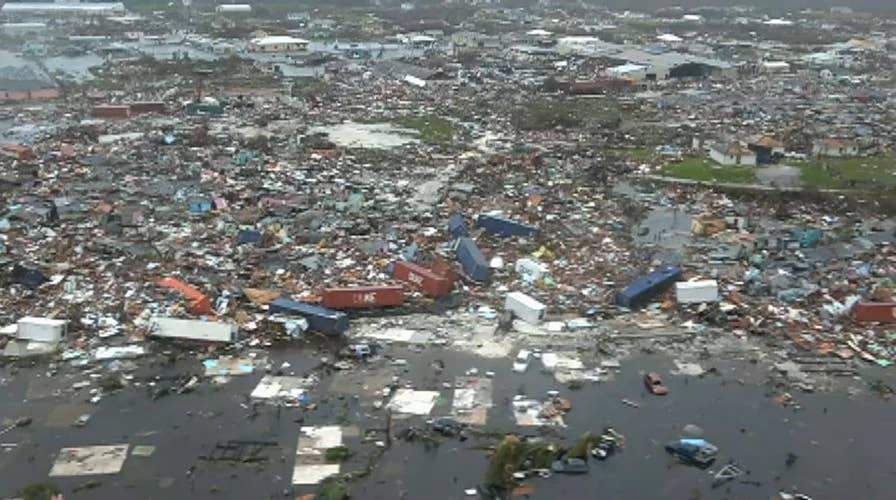Aerial footage of Abaco Island reveals extent of devastation from Hurricane Dorian
Hurricane Dorian stalled over the Bahamas for a day and a half, pounding the islands of Abaco and Grand Bahama with winds up to 185 mph and torrential rain.
As a massive hurricane creeps up on the East Coast, Washington’s windbags are in full voice. But what politicians say in an emergency matters little, and what Washington does when calamity strikes matters far less than most people imagine.
The Trump era has witnessed repeated instances of the president’s political opponents seeming eager for disaster to strike. After all, any disaster offers the opportunity to point fingers and either decry a lack of presidential leadership or blame a presidential policy.
In recent months, some Trump critics seemed to be positively rooting for the nation to either stumble into recession or be plunged into a war with Iran. Frustrated on those fronts, they now appear to be pinning their hopes on Hurricane Dorian.
We’ve been down this weather-beaten road before. In 2017, when hurricanes slammed the U.S., Trump was being blamed for a poor response even before they made landfall. After Texas and Florida came through the storms in an orderly fashion, the criticism was largely muted.
More from Opinion
But Puerto Rico was another story. Hurricane Maria devastated the island, and Trump’s opponents followed the same playbook used against President George W. Bush in 2005 after Hurricane Katrina — they tried to blame the problems on Trump rather than the storm.
Trump weathered these attacks well, in part because many of the accusations were just way over the top. It was quickly evident that the biggest problems in response had nothing to do with the administration. Response logistics were complicated by the inescapable fact that Puerto Rico is an island located about 1,000 miles from the U.S. mainland.
CLICK HERE TO SIGN UP FOR OUR OPINION NEWSLETTER
The recovery was further complicated by the fragility of the existing infrastructure and the lack of good local governance directing the response. We were reminded of this last point last month, when public protests over the outrageous abuses of the government and its incompetence forced the governor to resign. It was reminiscent of the aftermath of Katrina, which saw the Louisiana governor voted out of office and the mayor of New Orleans sent to jail for corruption.
None of these conditions is likely to be repeated as Hurricane Dorian works its way along the East Coast. While all the focus is on the president, it is worth recalling that, in natural disasters, the federal government’s role is to backstop the state and local response, not supplant it.
Danger to life is greatest during — and immediately after — disaster strikes. That’s what makes local, on-scene responders the most crucial to a successful recovery.
They know the people, the territory, the area’s physical assets and limitations, and the capabilities of local social, civic and business organizations. This knowledge allows them to accurately assess and prioritize recovery needs and efficiently organize and dispatch the resources.
In a large-scale catastrophe, the federal government can and should fall in with assets, but most of that help is to backstop the needs of state governments and local communities — often providing and deploying those assets at their direction. And, of course, the U.S. Coast Guard always plays an important role in responding to sea storms. During Katrina, for example, Coast Guard assets rescued more than 3,000 people.
But the people who are usually first-on-site after a disaster and the ones who do the real heavy-lifting of recovery are usually those who live in the community. Faith-based groups are particularly prone to jump in to help their fellow citizens — and they do outstanding work. After Katrina, surveys found that faith-based organizations were rated as the most responsive and effective recovery workers by far.
For now, it looks like Dorian will soak Florida and then maybe take a swing at North and South Carolina. What these places all have in common is good infrastructure, solid governance, disaster-response experience, and many strong, resilient communities. Odds are they can take what Dorian can dish out.
CLICK HERE TO GET THE FOX NEWS APP
As for the White House, the reality is that the federal government has likely already done most of the important stuff already: pre-positioning assets, anticipating requirements, and coordinating with the state governments to get ready.
In World War II, the big challenge for Gen. Dwight Eisenhower was working out all the steps he had to take before D-Day. Similarly, the real challenge for Washington comes before the storm hits the beach. After that, the critical work of saving lives and property is up to the men, women, neighbors and responders in harm’s way.








































